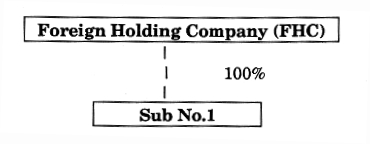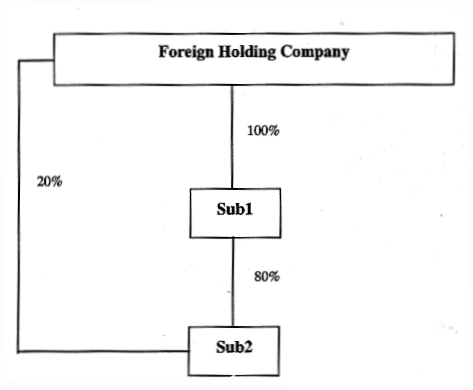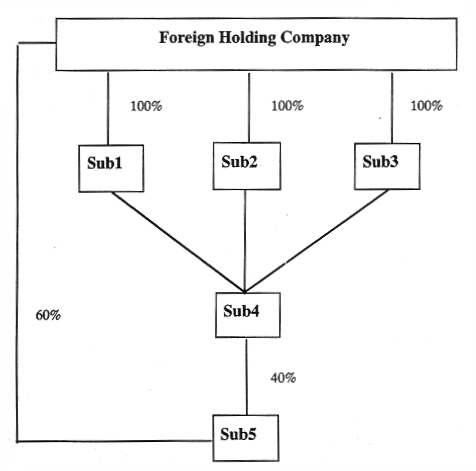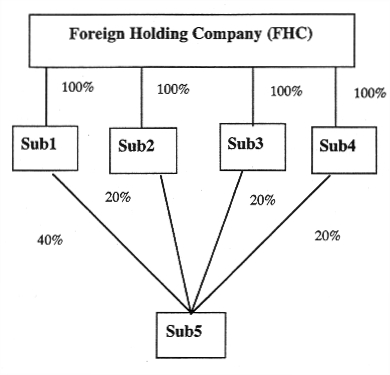Explanatory Memorandum
(Circulated by the authority of the Treasurer, the Hon John Dawkins, M.P.)Exemption for Interest in a Foreign Bank
Overview
Banking is not an eligible activity for the purposes of the active business exemption (ABE). The opportunity to invest in a foreign bank without attracting FIF taxation will be provided on a restricted basis through a specific exemption for an interest consisting of shares in a publically listed bank and a holding company of a bank, whose shares are widely held.
Explanation
The banking exemption in Division 4 applies to an interest in a FIF that is a share in a foreign company that carries on banking or a foreign holding company of a foreign bank.
Foreign bank - approved stock exchange
The shares an Australian resident investor holds in a foreign bank must be of a class of shares listed on a stock exchange approved in Schedule 3. There are 113 stock exchanges listed throughout 48 countries. Unlisted shares issued by some banks as a substitute for deposits with the bank would not satisfy this criteria.
Foreign bank - taxpayer's interest in foreign bank
Where a taxpayer holds shares in a bank which are listed on an approved stock exchange as well as shares that are either:
- ot quoted on the stock market of any stock exchange, or
- re quoted on a stock market of a non-approved stock exchange,
then, only that part of the interest in the bank comprising the taxpayer's shares that are quoted on the stock market of an approved stock exchange will be exempt from the FIF measures, provided the other requirements of paragraph 503(a) are satisfied.
Foreign bank - trading requirement
An additional requirement is that shares of the foreign company must be 'widely held and actively traded on a regular basis' on a stock market of an approved stock exchange during the period in which the exemption applies to the relevant taxpayer. [Subparagraph 503(b)(i)]
The term 'widely held' does not have the same meaning as the term 'widely distributed' used in section 327A of the Principal Act. It has a much higher threshold than the term 'widely distributed' which only requires that 20 per cent of the share holders must not hold more than 75 per cent of the share capital.
The requirement that the shares in the foreign company are 'widely held' by the public at large will ensure that the exemption does not apply to shares in closely held or privately owned companies.
The term 'widely held' must also be read in connection with the requirement that the shares be actively traded on a regular basis.
The phrase 'actively traded on a regular basis' is viewed in the context of the trading pattern and volume of the particular stock market. In times of recession the degree of trade required to satisfy this criteria will be considerably less than in a bullish market.
To satisfy this requirement it will be necessary that for the majority of the time in which the exemption operates in respect of a particular taxpayer there was an active market in the shares of the foreign bank on any stock market of an approved stock exchange on which the shares in the foreign bank were listed.
The foreign company must be authorised under the law of its place of residence to carry on banking business [subparagraph 503(b)(ii)] . This requirement will ensure that the company meets any regulatory requirements for banking business imposed by its country of residence.
Foreign bank - principally engaged in the active carrying on of banking business
The additional requirement imposed by subparagraph 503(b)(iii) that the foreign company is, during the period in which the exemption applies to the taxpayer, 'principally engaged in the active carrying on of banking business' requires that:
- he foreign company's main activity is banking business; and
- he foreign company is not only nominally conducting banking business.
Exemption for interest in a foreign holding company of a foreign bank
It is not uncommon for the banking business to be structured so that shares in the licenced bank are held by a holding company. Members of the public invest in the bank by the acquisition of publicly listed shares in the holding company. To allow for these investments, the exemption for certain shares in a publicly listed foreign bank will be extended to an interest that an Australian resident holds in a foreign holding company with a wholly-owned subsidiary which is a foreign bank. [Section 504]
Foreign holding company - approved stock exchange or sectoral classification system
The exemption will apply to shares held by a taxpayer in a foreign holding company which is classified as either a 'bank' or under 'banks' or as engaged in 'banking' on either:
- stock exchange approved in Schedule 3, or
- n international sectoral classification system in Schedule 5.
The shares the taxpayer holds in the foreign holding company must be of a class quoted on any stock market of an approved stock exchange.
Foreign holding company - trading requirement
During the period in which the exemption applies to a taxpayer, shares in the foreign holding company that are quoted on the stock market on an approved stock exchange must be 'widely held and actively traded on a regular basis'. [subparagraph 504(b)(i)] This phrase has the same meaning as the phrase used in subparagraph 503(b)(i) discussed under the subheading 'Foreign Bank - trading requirement'.
The subsidiary or subsidiaries of the holding company must be wholly-owned. [Subparagraph 504(b)(ii)]
Foreign holding company - wholly-owned subsidiaries
A definition of "wholly-owned" subsidiary is contained in section 479. The following diagrams illustrate wholly-owned subsidiaries of a foreign holding company. [Section 479]
X% = percentage of share capital held by company in immediate succeeding lower-tier company.
| Foreign Holding Company (FHC) |
| | |
| | 100% |
| | |
| Sub No.1 |
| Sub No.1 is a wholly-owned subsidiary of FHC |




Foreign holding company - one wholly owned subsidiary
Where the foreign holding company owns only one wholly-owned subsidiary, the subsidiary must be:
- uthorised under the law of its country of residence to carry on banking business; and
- rincipally engaged in the "active carrying on" of banking business. [Subparagraph 504(b)(iii)]
One wholly owned subsidiary - principally engaged
The phrase 'principally engaged in the active carrying on of banking business' [sub-subparagraph 504 (b)(iii)(B)] has the same meaning as in subparagraph 503(b)(iii). See the discussion under the heading 'Foreign Bank - principally engaged in the active carrying on of banking business'.
Foreign holding company - two or more wholly owned subsidiaries
Where the foreign holding company owns two or more wholly owned subsidiaries the principal activities of the companies in the group taken together as an economic unit must be the active carrying on of banking business. [Subparagraph 504(b)(iv)]
This requires that:
- he activities of the group, when viewed as a single unit, are mainly banking business;
- large majority of the activities conducted by the group are banking business; and
- he group is not just nominally conducting banking business.
The requirement that the group be principally engaged in banking business will allow for some wholly-owned subsidiaries in the group to engage in the conduct of banking related business such as financial services, funds management, or insurance activities that are incidental to and related actively to banking.
To determine if the banking exemption applies to the share that the investor holds in the foreign bank or holding company of a bank, the taxpayer will test for the requirement discussed above at the end of the notional accounting period of the foreign company that ends during the taxpayer's year of income.
The definition of a notional accounting period of a foreign company that is a FIF is set out in section 486. Generally, it is the year of income of the taxpayer unless the taxpayer elects for the accounting period of the company.
However, the following requirements must be satisfied throughout the period in which the taxpayer holds shares in a foreign bank or foreign holding company:
- here there is a direct shareholding in a bank, the foreign company must be principally engaged in the active carrying on of the banking business; and
- here there is a holding company of a foreign bank, the principal activities of the foreign holding company and all of its wholly-owned subsidiaries must be banking business; and
- he shares in the foreign bank and foreign holding company must be widely held and actively traded on a regular basis on a stock market of an approved stock exchange.
